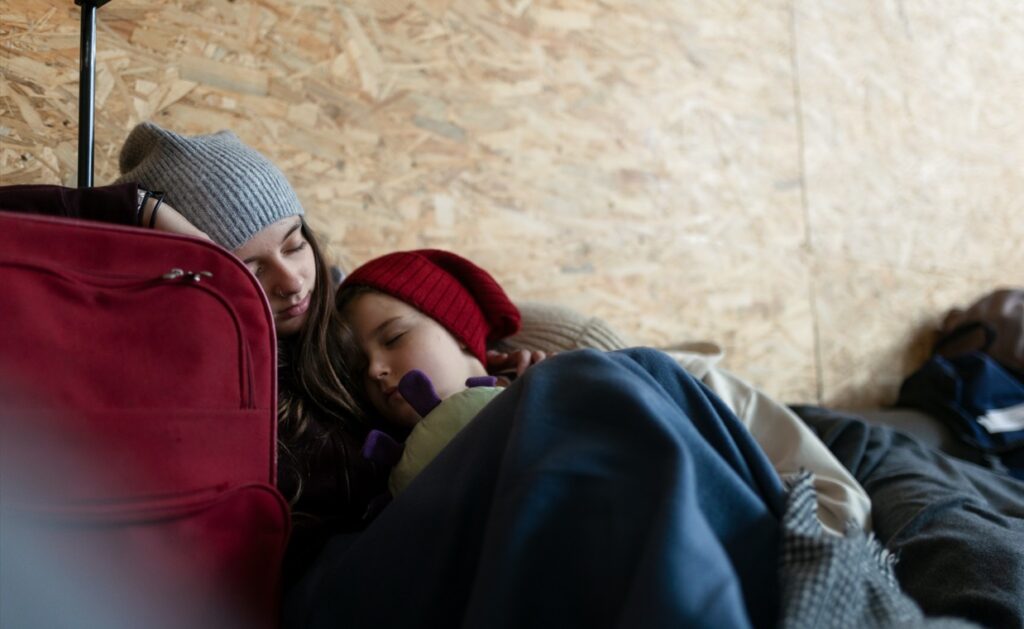
WORLD DAY FOR MIGRANTS AND REFUGEES AND THE JUBILEE OF MIGRANTS

Many years ago, when I was sitting in the room in Ottawa to officially become a Canadian citizen, I was struck by the diversity of people in the room. There were probably 40 or 50 people there, many of those included were family members of all of us new citizens. Each country was named, and it became clear that the majority of the others there were not there by choice of marriage partner as I was, but they were there having been forced to leave their home – either from the “push” of issues they needed to get away from or the “pull” of a better and safer opportunities for themselves or their families.
My great-grandparents were immigrants. My husband’s grandmother was a newcomer to Canada. Stories of immigrants are not far removed, and these memories can help document the lives of our family to be able to share with our own children. Why did they choose to leave their home? Why did they choose their new home country?
The focus of World Day of Migrants and Refugees is to help us to acknowledge the value of hope manifested in having newcomers in our midst: How immigrants help our communities, our economies and the personal witness of hope that each brings.
Susanna Moodie in her book Roughing it in The Bush starts out with a statement about emigration and why people leave their home countries. She shares her anecdotes about starting a new life with her husband in the 1830s in what would become Canada. There were incentives for newcomers at the time as the land was being cleared and new communities developed. Like Moodie, I am an immigrant, but I am not a refugee. My reason for coming to Canada in the 1970s was the “pull” of a relationship.
One current refugee story is the Syrian family who was hosted by the community of Antigonish in Nova Scotia. The family came from a war-torn country when they lost their business and their home. They brought their skills in making chocolate to that small community and now, a few years later, they ship their products all over Canada and the world. Tareq Hadhad, who was the first of his family to arrive, had wanted to become a doctor, but now, in addition to helping to run the family business, he speaks to schools and businesses about his experience and their aim to promote world peace with their Peace by Chocolate products. Newcomers like the Hadhad family not only bring their hope for peace, but they also make delicious and diverse chocolate treats. I love their slogan “One peace won’t hurt.”
There is an inspiring poem by Warsan Shire describing the struggles with emigrating. This excerpt tells some of the challenges:
Home… I want to go home, but home is the mouth of a shark home is the barrel of a gun no one would leave home unless home chased you to the shore… no one leaves home until home is a voice in your ear saying leave, run, now, I don’t know what I’ve become.
The theme this year for World Day of Migrants and Refugees is “Migrants, Missionaries of Hope” and October 4 and 5 are the dates of celebration within the Church. Pope Leo reminds us that Jesus, Mary and Joseph had to flee to safety far from home and family. “Under his wings you will find refuge (Psalm 91:4)” might have given them the hope they needed to travel to a new place. It took years for them to return to their families and their hometown, but many refugees may never be able to return home or see their families again.
This week is also a time for us to consider ongoing Truth and Reconciliation with our Indigenous sisters and brothers. Part of the truth is that, unless we are First Nations, Metis or Inuit, we are all immigrants to Canada. When we consider our ancestors and their travels, can we embrace the others coming to this country and our communities, and offer them love and peace? Can we somehow foster their hope for peace? May we be messengers of hope to the newcomers we meet?
Pope Francis, who chose to align this day with the Jubilee of Migrants and Missions, shared a prayer which ends with “May we share with them the blessings we have received from your hand, and recognize that together, as one human family, we are all migrants, journeying in hope to you, our true home, where every tear will be wiped away, where we will be at peace and safe in your embrace.”
And this beautiful blessing from 2 Thessalonians 3:16: “May the Lord of peace himself give you peace at all times in all ways.”
Jeanne Lambert combines her experiences as a parish and community nurse and her music ministry, and she continues to find ways to include music in pastoral care and community hospice work. Jeanne has many diverse writings and presentations to her credit on family life, grief, wholistic health care and spiritual reflection.


